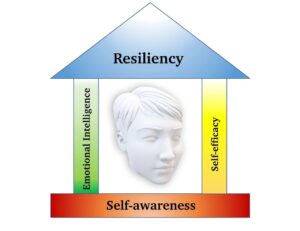Why measure your organization’s resiliency? (Part 2)


Higher resiliency creates culture change and success – Take the Quiz The foundation of individual and organizational resiliency is heightened self-awareness. This awareness is not static but dynamic and able to be impacted by internal motivation and focus.
As each of us has an internal desire and willpower to improve our understanding of ourselves, self-awareness will increase. This includes how we think, what we choose to focus on, why we behave the way we do and exploring with curiosity and intention that will lead to more constructive responses.


Emotional intelligence (EI) and self-efficacy
There are two bridges to resiliency as self-awareness is increased: emotional intelligence (EI) and self-efficacy. Individuals have to acquire a basic sense of self-awareness in order to achieve higher levels of EI and self-efficacy. Albert Bandura is one of the most respected modern researchers related to self-efficacy.
He aptly defines it as an individual’s belief that they can execute behaviors that are needed to achieve a specific goal. He further goes on to say that self-efficacy is an indication of their ability to control or not control their motivation, social environment and behavior.
As employees set their sights on performance goals, self-efficacy is important. If an individual doesn’t think they can reach a goal then the likelihood they will reach it is significantly diminished. As Henry Ford put it: “whether you think you can, or you think you can’t – you are right.” Self-efficacy also determines what goals we attempt to reach, how we attempt to accomplish them and what we think about our performance as we strive to achieve these goals.
As an individual’s moods, emotions, perceptions, and overall stress levels impact psychological reactions, organizations can work to equip employees with tools to reduce stress. As organizations invest in teamwork and interpersonal skills that increase the social responsibility of its workforce in mentoring and encouraging peers, self-efficacy is further enhanced due to the social persuasion factor.
It turns out that our peers excelling and doing well; additionally encouraging us to do the same, increases our capacity to succeed also. Instead of organizations seeing employee performance as the personal responsibility of individuals alone, organizations are becoming aware of their ability and self-interest to impact performance.
As organizations make culturally-impacting decisions on where to invest their precious time and resources, in regards to employee performance and training, EI and both individual and organizational resiliency deserve some attention. By normalizing and emphasizing the importance of and the potential to improve overall individual, as well as organizational resiliency, EI will naturally improve.
EI is internally applied but is the externally observed outcome of holding awareness of thoughts, emotions, and beliefs. This concept has become more widely accepted over the past decade as research shows better work performance, team leading and success in individuals with high EQ (emotional quotient) versus high IQ.
EI is increased through intentionally choosing those thoughts that presume the benefit of the doubt and a desire to be curious about other perspectives within relationships, teams, and performance. Resiliency encompasses the skills of EI and is also an employee health measure that is the product of practicing ongoing self-care and utilizing known resiliency tools that lead to becoming protective factors against chronic stress.
Despite individual resiliency being intrapersonal; it is measurable within the organization. All of this interpersonal work and emphasis positively impacts all aspects of life including home, school, work, and other systems. Additionally, just as our thoughts and beliefs impact ourselves and those around us, others have the same effect on us.
This can be seen as you consider a colleague walking into a meeting late, shifting in his seat, looking at the clock, being short with people and obviously distracted; frustrated about something. No one in the room is sure if the frustration is with the group or something outside of work but mostly everyone is feeling the uneasiness.
Some are feeling it consciously, with full awareness of their emotions being shifted by this individual, while others are not consciously aware but rather subconsciously impacted, eg. feeling uncomfortable and thereby avoiding the situation. This impacts the meeting conversations and free flow of creative discussions that struggle to flow in these types of circumstances.
Organizations that ignore or condone these types of behaviors miss an opportunity to bring awareness to the employee of the impact of their actions. This can be done in a compassionate, non-punitive way that explains how this affects themselves, their colleagues and group cohesiveness.
Additionally, it also affects outcomes such as lost productivity and lengthening the time it takes to reach cross-functional organizational goals. At first glance, these actions can have interpersonal impact but at closer inspection, also have financial repercussions.
To improve these three building blocks of organizational resiliency, Ajivar is a great tool to explicitly and implicitly enhance self-awareness, EI, and self-efficacy. Interaction with the platform on a daily basis will expose the employee to, learning more about themselves, how they react to discomfort and perceived negative situations, increased confidence in identifying what they are feeling, and gain skills on how to deal with thoughts and feelings appropriately.
Self check-ins are offered daily, serving as reminders to the individual to gauge and manage their emotions, thoughts, beliefs, and how each of these feel within the body. These check-ins improve the individual’s responsiveness within social interactions and improve relationships. By being more mindful and allowing the mind to be fully present in the moment, increases this self-awareness.
Dr. Joe Dispenza talks about mindfulness
Mindfulness practices positively impact brain coherence. When the brain becomes more coherent through intentional mindfulness practice, stress is decreased in the body. This, in turn, improves how the mind is structured.
When the brain is functioning in a coherent manner and stress is reduced, an employee’s capability to accurately interpret and respond to situations within their environment shifts. The capacity for improving self-efficacy due to their sheer belief alone improves performance.
Belief in one’s capabilities is a fundamental, often overlooked, yet impactful and tangible goal to aspire to within organizational settings. Again, this leads to overall improved resiliency. Imagine an employee has been in four back to back meetings and is overwhelmed by stress. They are preparing to enter into their fifth meeting of the day. This meeting is important as this is with a new partner.
Having a work culture focused on employees improving and managing self-awareness and emotional intelligence would increase the likelihood of this employee entering this pivotal 5th meeting of the day understanding the importance of using a tool such as Ajivar.
Daily use of Ajivar would help the employee reduce stress, bringing their brain into coherence, as well as improving their interpersonal communication and performance during this critical meeting. As employees gain belief in their ability to accurately interpret their emotions and tuning into the body, they will begin to naturally self-assess their stress levels throughout the day and reach for quick, essential tools as a means to feel better and perform more effectively throughout the day.
This could include deep breathing, going for a walk or brief meditation. Having self-awareness and emotional intelligence, believing in one’s own capacity to successfully manage thoughts and emotions leads to overall improved resiliency. As the organization implements strategies designed to positively impact internal programs, their effect at improving wellness can be measured immediately.
This will not only have financial benefits to the organization but will also increase work performance, morale, and overall well-being.
Click here to test your organizational resiliency using our brief Organizational Resiliency Quiz This is a short survey we have developed to measure your organization’s Resiliency with the focus on the individual employee’s resiliency.
This tool combines existing research with your real-time collective feedback; thus, it is meant to evolve quickly. Your responses will help develop ongoing versions of the questionnaire.
Post navigation
Related Posts


The Power of Mindfulness
Emerging research has shown incredible benefits of practicing mindfulness on a daily basis, particularly meditation.


What are Posimations?
Posimations, a cool term we invented at Ajivar, are really an abbreviation of “positive affirmations.”


We change the world by increasing Emotional Intelligence
~ Self-awareness is key ~Emotional intelligence (EI), is a competency skill that covers many areas


Accepting your mind chatter
You are fully in charge! If experts say that we have about 70,000 thoughts in